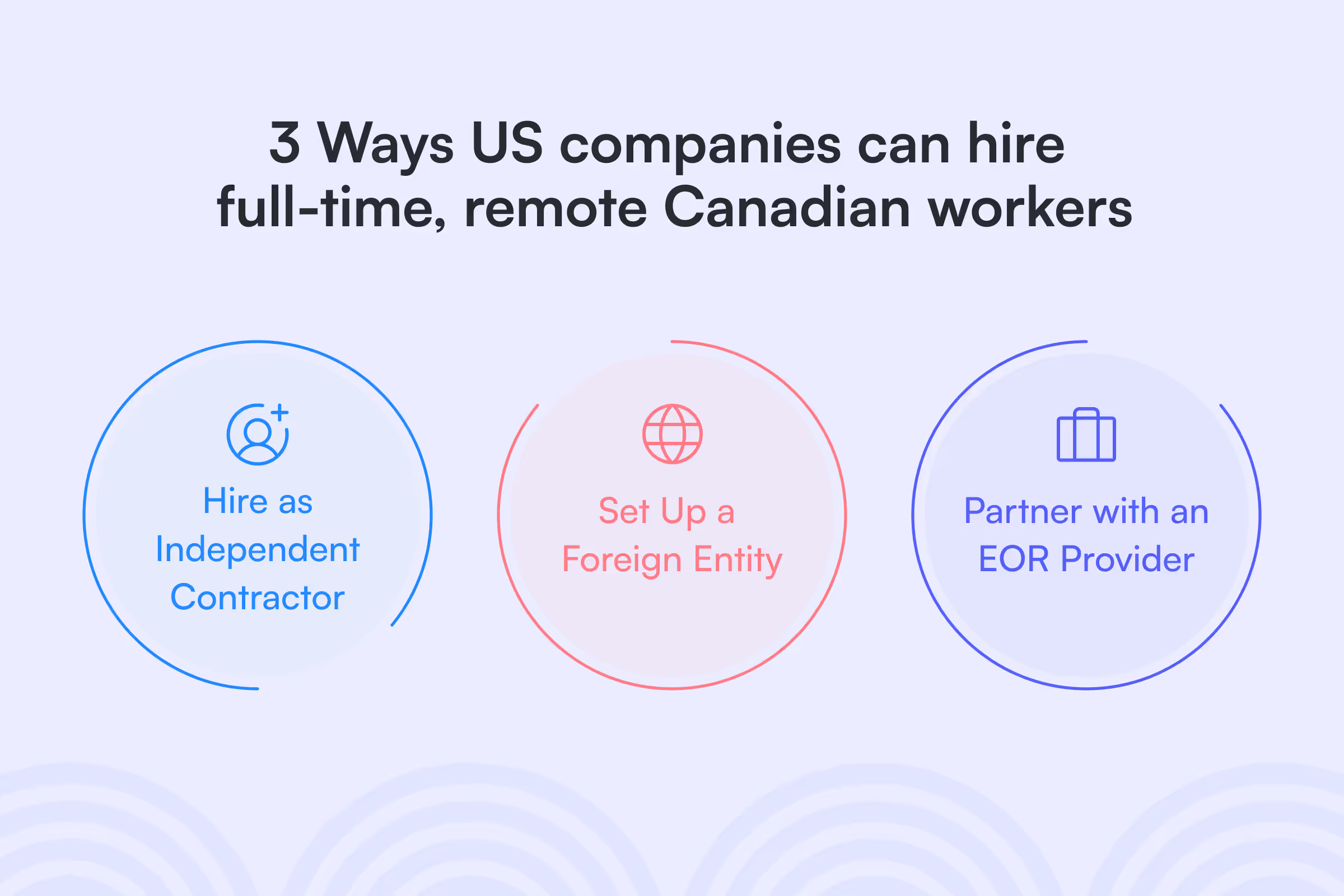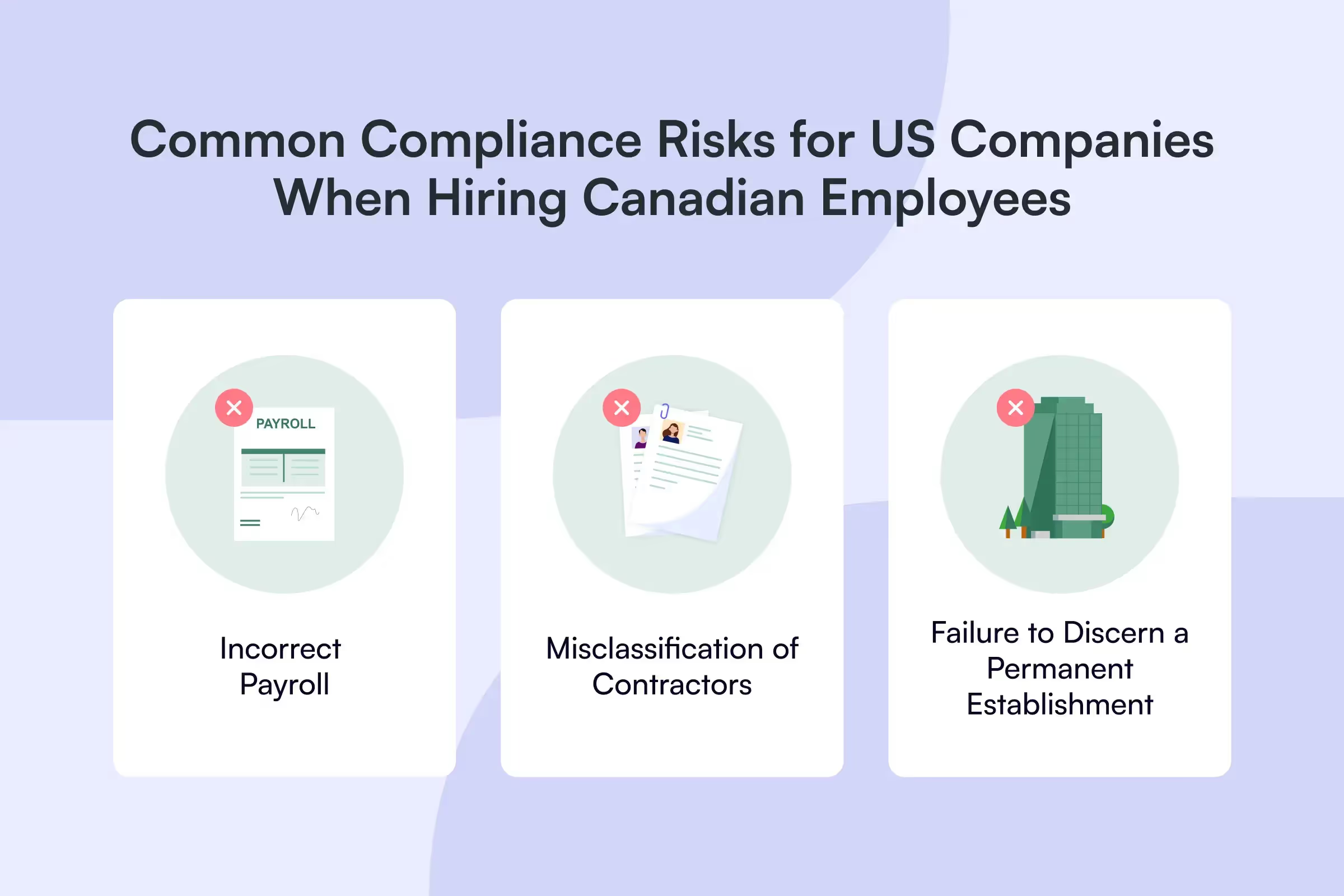Expanding your business internationally is a strategic move, which is why many American companies are hiring remote workers from abroad. When you're considering global expansion, Canada's deep talent pool can be a valuable resource. However, despite the advantages, hiring employees in Canada comes with unique challenges.
There are hurdles to navigate, including compliance with local labor laws, managing payroll across borders, handling tax obligations, and understanding differences in workplace regulations. If you're a US company exploring how to hire employees in Canada, there are numerous factors you should take into account.
Canada and the US share many similarities—including overlapping time zones, common business language, and comparable workplace cultures—making it relatively seamless for US companies to hire Canadian talent. Canada's competitive hiring costs and potential for tax efficiencies make cross-border employment even more attractive. US companies can often offer salaries that are highly competitive in the Canadian market while still managing overhead spend on both compensation and office infrastructure.
So, is your US company ready to hire remote workers from Canada? Let's dive in.
Can a US Company Hire a Canadian Citizen Remotely?
Before delving into the specifics of hiring remote employees in Canada, it's essential to address the fundamental question: legally, can US companies hire remote foreign workers? The answer is a resounding yes.
US companies have the flexibility to hire remote workers from almost any foreign country, including Canada. This allows businesses to tap into a diverse talent pool outside of the US and benefit from the expertise and skills of international employees. This practice is increasingly common in the era of remote work and remains fully compliant when executed properly.
However, there are crucial employment standards to keep in mind, as well as legal and logistical considerations such as work authorizations, taxation, and payroll compliance. Understanding these factors prepares your business for the seamless integration of remote workers into your team.

How can U.S. companies hire full-time remote workers from another country?
Companies keen on tapping into a new and diverse talent pool and considering how to hire an employee in Canada have three distinct approaches available.
The right choice ultimately hinges on the unique needs and preferences of your business and your employees. Each option comes with its own set of advantages and drawbacks. Let's take a closer look at them.
1. Engage Canadian workers as independent contractors
One option on the table is bringing on Canadian workers as independent contractors. It's a pretty common approach and seems straightforward. However, there are some nuances to remember.
Per law, independent contractors have the freedom to set their own working hours and schedules, take on additional clients, and even bring in subcontractors to share the workload. While it sounds flexible, the catch is it might not give you a traditional employer-employee setup with clearly defined roles and responsibilities as you'd have in a permanent full-time role.
Choosing this option requires careful legal consideration too. If you misclassify independent contractors as full-time employees, you could end up dealing with higher income tax obligations, as per the Canada Revenue Agency (CRA). Any mix-up in classification could lead to legal complications for both you and the employee.
2. Incorporate and set up a foreign entity in Canada
While setting up a foreign entity is significantly more complex, it comes with a host of advantages. It hands US employers complete control over their Canadian operations, including hiring, payroll management, creating a physical presence, and, potentially, long-term cost savings.
It is, however, worth noting that setting up a foreign entity, even in a neighbouring country like Canada, can be quite a costly, comprehensive, and time-consuming process. It demands a deep understanding of Canada's legal landscape and a thorough approach to strategically position your business within the country.
It's advisable to consult with professionals who specialize in compliance laws to steer clear of any potential complications along the way. You can turn to reputable institutions, trusted partners, or seasoned management consulting firms to ensure that your decisions throughout this process are well-informed and sound. If you need help with recruiting for your entity, specialist Canada headhunter firms may be of assistance.
3. Partner with an employer of record (EOR) provider
- Manage everything related to Canadian payroll, including timely and compliant taxes, remittances, and salary payments
- Ensure compliance with all tax regulations in Canada and the US, including federal, provincial, state, and local levels
- Administer both mandatory and supplemental benefits, including holidays, overtime pay, parental leave, health insurance, and more
You can take this route by partnering with an established global EOR provider, such as Borderless. We can handle your tax and labor law compliance matters, allowing you to keep your focus on what you excel at—driving the success of your business.
.avif)
What U.S. companies need to know when hiring an employee in Canada
Canada offers access to top-tier talent, but before you dive in, there are key considerations you should understand. Knowing the local labor laws will enable you to better navigate the Canadian employment landscape, which ultimately fosters a stronger connection with your remote workers.
Let's delve into these key considerations to ensure your Canadian hiring process goes smoothly and successfully.
Canadian employment laws differ across provinces
Employment laws are upheld both at the federal and provincial levels, and it's important to note that they can vary depending on the province your team is in. Each of Canada's ten provinces and three territories has established its distinct set of regulations covering various aspects of employment, including taxation, social security, benefits, and more.
It's crucial to ensure compliance with each region's specific employment rules and regulations, even when working with an Employer of Record (EOR). Be diligent in confirming that your EOR partner adheres to the applicable employment laws in each province or territory.
Minimum wage and overtime rules in Canada
Each Canadian province and territory sets its minimum wage and regularly reviews these rates to keep up with factors like inflation. As of early 2026, Canada's federal minimum wage is $17.75 per hour (effective April 1, 2025), with an expected adjustment to approximately $18.10 per hour on April 1, 2026, based on the Consumer Price Index.
Provincial and territorial rates vary. For example, several provinces including Nova Scotia and Prince Edward Island have confirmed minimum wage increases taking effect in 2026, ranging from $16.75 to $17.00 per hour depending on the jurisdiction and effective date.
When it comes to overtime pay in Canada, employees become eligible when they exceed a certain number of hours per week. These thresholds differ from province to province, but according to federal law, employees can opt for overtime pay or extra paid time off (PTO), usually earned at a rate of at least 1.5 hours of pay or PTO for every hour of overtime worked.
Remote employees will follow the rules of their province of residence when it comes to wage and overtime payments.
Hiring and discrimination protections for applicants
There are strict rules governing what employers can ask job applicants to ensure fair treatment. Questions about age, gender, sexual orientation, religious beliefs, marital status, and other similar factors are off-limits.
Canada's regulations on this are more stringent than those in the United States. For instance, Canadian employers are also prohibited from asking about an applicant's immigration status in the country.
Probationary periods and fixed-term contracts
A probationary period is a phase at the start of employment which aims to assess an employee's performance and suitability. During this time, there's often more flexibility for both the employer and employee to terminate the relationship while still adhering to employment laws and the contract. Successfully completing this period enhances the employee's job security and rights under labor laws.
Companies operating in Canada commonly institute probationary periods at the start of employment relationships, typically lasting anywhere from one to six months. Some provinces, such as British Columbia, require a minimum probation period of three months, even for companies that don't explicitly mandate it.
Under fixed-term contracts, employees have the same employment rights as permanent staff. Both the employer and the employee share the mutual expectation that the employment arrangement will naturally conclude on the contract's specified end date.

Employee and payroll records collection
Following legal requirements, employers in Canada are obligated to gather and maintain comprehensive employment records for both full-time and part-time employees, including payroll information. They must keep these records for a minimum of 36 months from the collection date. Given potential privacy law implications, finding legal ways to adhere to these regulations is essential.
At-will employment in Canada vs. the U.S.
In contrast to the United States, Canada does not embrace the concept of at-will employment, where an employer can terminate an employee for any reason, with or without cause, and without prior notice. In Canada, while employers have the right to dismiss employees for valid reasons, it is expected to be executed following certain regulations.
When employees are let go without just cause, there may be a requirement for notice or payment in lieu of notice. A reasonable notice period, which will be stipulated in the employment contract, must be provided and should also consider various factors, including an employee's tenure, seniority, job role, and other relevant factors.
Common employee benefits in Canada
Just like in the US, there are certain benefits that a full-time employee in Canada is entitled to. Here are a few.
Paid time off (PTO)
In recent years, Canadian labor laws have emphasized paid time off (PTO) entitlements for employees. Employees who have worked for 12 months must receive two weeks of time off per year. Additionally, every five years of consecutive employment with the same organization entitles employees to a minimum of three weeks off per year, and so on.
Personal leave and holiday pay
After working for three months or more, employees must receive five days of personal time off, although employers are only required to pay for the first three days.
Canada has several federal and provincial holidays that are mandated for all employees. Formerly, new employees would need to work for 30 days to receive holiday pay. This has been replaced with mandatory holiday pay as long as employees are working on the day the holiday falls. They are entitled to holiday pay as soon as they begin their employment contract.
Parental leaves and benefits
In Canada, employees who give birth are guaranteed at least 15 weeks of federally funded maternity leave, although some provinces have longer requirements. In addition, new parents are entitled to a minimum of parental leave—either up to 35 weeks under the standard parental benefit option or up to 61 weeks under the extended parental benefit option—regardless of gender.
For 2026, the maximum weekly EI maternity and standard parental benefit is $729, based on the 2026 Maximum Insurable Earnings (MIE) of $68,900.
Health and other types of insurance
Although the government of Canada does offer publicly sponsored health coverage, organizations generally tend to offer more robust health insurance as a perk to attract top talent. With private health insurance from employers, employees can access faster care and cover a wider range of procedures. Although not mandated, many employers offer vision and dental insurance to stay competitive.
Canada/Quebec pension plan
The Canada Pension Plan (CPP), founded in 1966, is the primary national retirement program for working Canadians. All employers and employees outside of Quebec must contribute to the Canada Pension Plan and those working in Quebec to the Quebec Pension Plan (QPP).
For 2026, the CPP contribution rate remains 5.95% for both employees and employers (11.9% for self-employed) on earnings up to the Year's Maximum Pensionable Earnings (YMPE) of $74,600. The maximum base CPP contribution per employee and employer is $4,230.45 each. An additional CPP2 contribution applies on earnings between $74,600 and $85,000, at a rate of 4% for both employees and employers, with a maximum contribution of $416 each.
Employment Insurance
The employment insurance program in Canada supports workers who become unable to work for various reasons, including temporary unemployment and pregnancy. For 2026, the EI premium rate is $1.63 per $100 of insurable earnings for employees and $2.28 for employers (who pay 1.4 times the employee rate). The maximum insurable earnings for 2026 is $68,900, meaning the maximum annual EI contribution for an employee is $1,123.07.
Rates are different in Quebec: employees pay $1.30 per $100 and employers pay $1.82 per $100, because Quebec administers its own parental insurance plan.

Key compliance risks for U.S. companies when hiring Canadian employees
When hiring remote employees based in Canada, it's crucial to ensure that you're in full compliance with tax and other employment laws applicable to both employers and employees.
In this section, we'll delve into some of the most prevalent compliance risks US companies may encounter when bringing on full-time remote workers in Canada.
Ensure accurate payroll contributions and deductions
As mentioned earlier, several factors—including an employee's take-home pay and the province of their employment—influence the contributions employers must consider. These contributions encompass pension contributions, employment insurance, vacation accrual, and more.
Any errors, delays, or omissions in these deductions could necessitate employers to recalculate, deduct, and remit the correct amounts to the relevant authorities. It's far wiser to get it right the first time and make accurate and timely payments than to rectify mistakes later, potentially facing legal complications.
Recognize the existence of permanent establishment
If your company maintains a fixed physical location anywhere in Canada and generates revenue, it constitutes a permanent establishment. Consequently, you must pay local, provincial, and federal taxes. Failing to recognize your company's status in Canada can lead to penalties and legal challenges.
Avoid misclassification of full-time employees as contractors
Hiring contractors for full-time positions carries the risk of misclassifying these employees. The CRA closely monitors this issue and underscores the significance of proper classification and the corresponding tax obligations, both in the company's home country (if applicable) and the country where it conducts business. This aspect is particularly crucial for US companies hiring employees in Canada.
Harness the potential of Canadian talent for U.S. businesses
Now that it's clear that it is indeed possible to hire Canadian employees from the US, the key to doing it seamlessly lies in meticulous compliance with labor laws and staying well-informed about them. The close collaboration between Canada and the US eases the process, and when you factor in the advantages of working with Canadian employees, it opens new doors filled with business opportunities and access to top-tier talent.
Not sure where to start? As your trusted Employer of Record with expertise spanning over 170 countries, Borderless is your partner in simplifying the hiring process. We specialize in assisting US employers as they navigate the Canadian employment landscape.
Talk to our global workforce experts today to discover how to accelerate and streamline your global hiring.
Disclaimer: Borderless does not provide legal services or legal advice to anyone. This includes customers, contractors, employees, partners, and the general public. We are not lawyers or paralegals. Please read our full disclaimer here.







.avif)
.avif)
